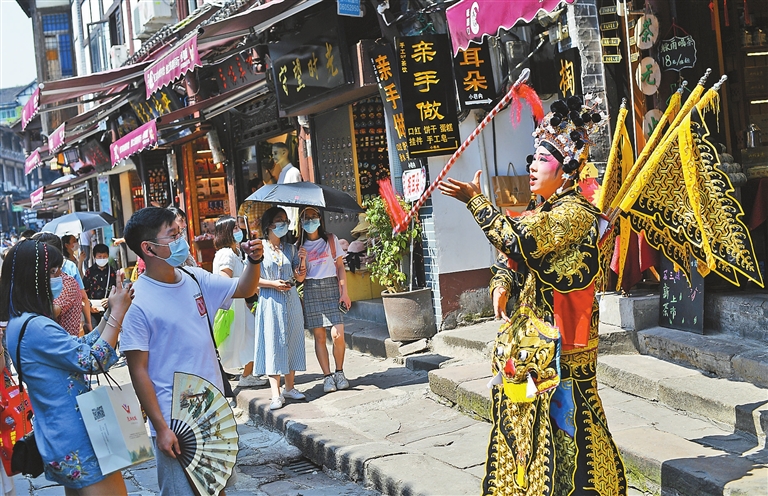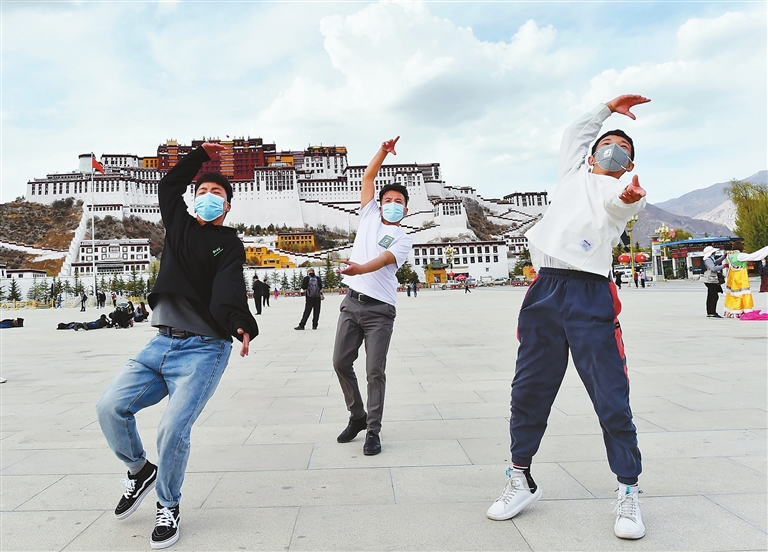

CHINA’S tourism sector is looking to offset the losses resulting from the COVID-19 pandemic by providing smart infrastructure and livestreaming at scenic spots. Statistics show that consumers who used to be primarily price-sensitive are shifting their focus, making travel safety a priority when they pick destinations. According to the Qunar travel platform, flight bookings for business and first-class cabins, which have fewer passengers, increased 46 percent in April from February — more than 10 percent higher than economy class bookings. Hotel data released by Qunar reflects a similar trend. Consumer interest in star-rated hotels with higher quality service and better safety standards have picked up remarkably since March. The number of people staying at four- or five-star hotels or higher in March was more than twice the number in February after hospitality businesses gradually resumed. First-tier cities like Shenzhen and Guangzhou in Guangdong Province saw faster growth in the number of guests at star-rated hotels than that of budget hotels in March. The concepts of consumption, travel experience and consumption frequency will continue to be different from what they used to be before the COVID-19 outbreak, said Ma Yong, a tourism and hospitality expert with Hubei University. “Tourists will give more priority to ‘fitness’ and ‘customization,’” Ma said. He added that self-driving tours, overseas study tours and family tours are expected to rise by leaps and bounds. The frequency of customized leisure trips will also go up. Services at scenic spots are also being provided in a more intelligent way to improve the travel experience and prevent the spread of disease. On April 13, nationwide tourist attractions were required to offer online booking systems to prevent crowds forming at busy periods. Travel agencies and scenic areas were urged encouraged to adopt smarter management measures. China’s largest online travel agency, Trip.com Group, launched online booking in April to that supports real-name ticket reservations, monitors tourist flows and handles after-sales service. Yu Xiaojiang, vice president of the travel company, said that there is an urgent need for scenic spots across the country to be intelligent and allow online booking. Trip.com will take advantage of its sophisticated service system to jointly build “smart tourist attractions” with interested partners, Yu said. Digitalization, together with capital, knowledge, innovation and other factors, is reactivating traditional culture and tourism resources. This, in turn, forms new engines of industry, said Dai Bin, head of the China Tourism Academy. In recent months, a large number of tourist sites started to respond to the latest livestreaming craze by allowing quarantine-bound tourists to log on to online guided tours and catch a glimpse of the early spring. Livestreaming platforms and travel agencies have teamed up with tourist sites to make online sightseeing more accessible. Celebrities from popular social media platforms have also been invited to spice up the tours. On April 15, Ke Jie, a 22-year-old known as one of the world’s best Go players, attracted more than 3 million viewers in less than two hours with a travel promotion livestream in the city of Lishui, East China’s Zhejiang Province. Since March, museums and galleries have staged online exhibitions of their rare treasures on livestreaming and video platforms, such as Mafengwo and Kuaishou, in an attempt to get a slice of the potentially lucrative market. “As the virus weakens nationally, the contained travel demand will be released gradually, and business players who have embraced digital market strategies will be the first to see success,” said Zhao Lei, in charge of consumer operations at Fliggy, an online travel agency owned by Internet giant Alibaba. (Xinhua) | 
